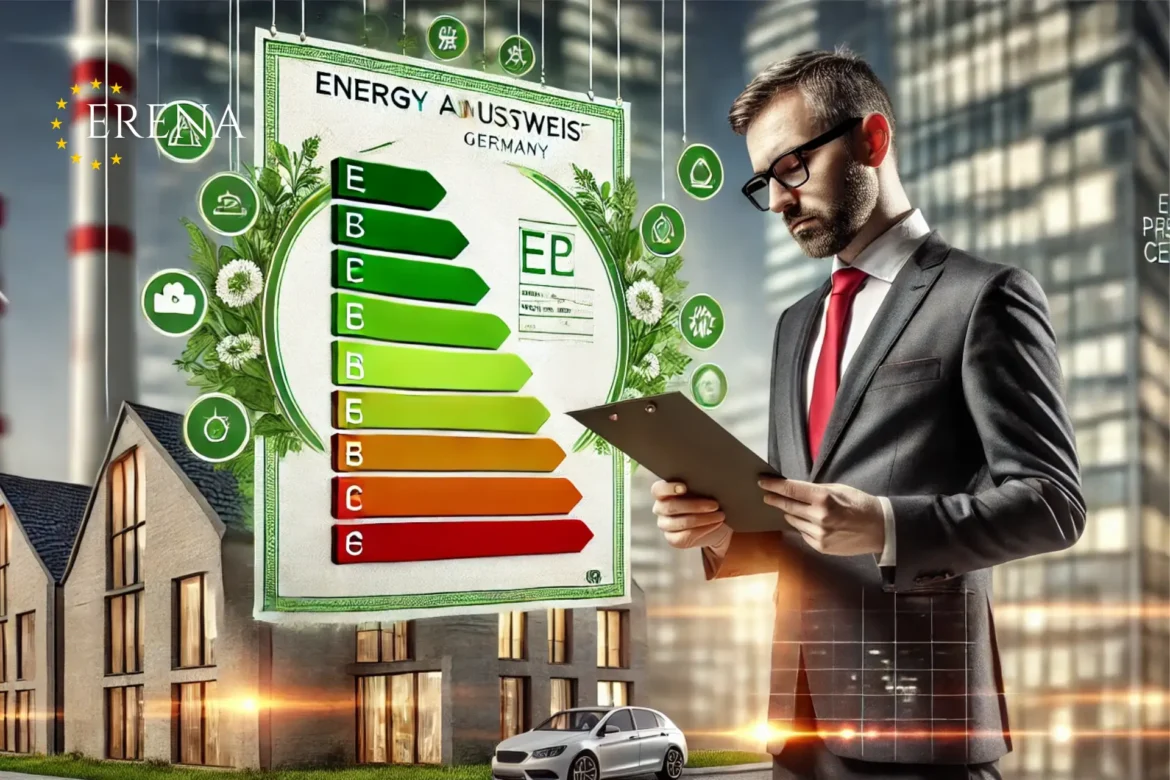The Energy Performance Certificate (Energieausweis) is an official document that assesses the energy efficiency of a building. It provides owners, tenants, and buyers with information about a property’s energy consumption or energy demand. In Germany, the Energy Performance Certificate has been mandatory since the Energy Saving Ordinance (EnEV) 2007 and was further regulated under the Building Energy Act (GEG) 2020.
It is required for new buildings, property sales, and rentals. Property owners must present it to potential buyers or tenants upon request.
Legal Framework:
- Building Energy Act (GEG) 2020
- Energy Saving Ordinance (EnEV) 2007-2020
- EU Energy Performance of Buildings Directive (EPBD)
For more details, visit: Energieausweis.de
2. Types of Energy Performance Certificates
There are two main types of Energy Performance Certificates in Germany:
a) Consumption-Based Certificate (Verbrauchsausweis)
- Based on actual energy consumption from the past three years.
- Uses heating cost bills or energy consumption data.
- Highly dependent on residents’ heating behavior.
- Cheaper than a demand-based certificate (Costs: approx. €50–100).
📌 When is a Consumption Certificate allowed?
- Buildings with more than five residential units.
- Buildings constructed after 1978 or older buildings that have been renovated.
- Commercial buildings (if comparable consumption data is available).
b) Demand-Based Certificate (Bedarfsausweis)
- Based on a technical analysis of the building.
- Calculates theoretical energy demand using building structure, heating system, and insulation.
- Independent of occupants’ energy usage behavior.
- More expensive than the consumption-based certificate (Costs: approx. €200–500).
📌 When is a Demand-Based Certificate mandatory?
- Buildings with up to four residential units, built before 1978, and not renovated.
- Heritage-listed buildings are exempt from the Energy Performance Certificate requirement.
ℹ️ More details on certificate types: Energieausweis.de
3. Importance and Purpose of the Energy Certificate
Why is the Energy Performance Certificate important?
✅ Transparency for Buyers and Tenants
- Tenants or buyers can assess the energy consumption of a property.
- Allows for a comparison of heating costs and additional expenses before signing a contract.
✅ Encourages Energy-Efficient Buildings
- The certificate motivates property owners to improve energy efficiency.
- Energy-efficient buildings have a higher market value and attract better rental opportunities.
✅ Legal Compliance
- Property owners must ensure their certificate is up-to-date.
- Fines for non-compliance: Up to €10,000.
✅ Guidance for Renovations
- Demand-based certificates highlight inefficiencies (e.g., poor insulation, outdated heating systems).
- The document often includes recommendations for improvements.
4. What Information Does the Energy Certificate Contain?
An Energy Performance Certificate includes:
🔹 General property information (construction year, number of units, address).
🔹 Type of certificate (consumption- or demand-based).
🔹 Primary and final energy demand (energy efficiency class from A+ to H).
🔹 Recommended renovation measures (if applicable).
🔹 Certificate validity period (10 years).
🔹 Issuer’s details and registration number.
💡 Energy Efficiency Classes for Buildings:
| Class | Rating | Energy Consumption (kWh/m²a) |
|---|---|---|
| A+ | Very efficient | < 30 |
| A | Efficient | 30-50 |
| B | Good | 50-75 |
| C | Average | 75-100 |
| D | Acceptable | 100-130 |
| E | High consumption | 130-160 |
| F | Very high consumption | 160-200 |
| G | Extremely inefficient | 200-250 |
| H | Energy waste | > 250 |
For more details, visit: Energieausweis.de
5. Who Issues the Energy Performance Certificate?
Only certified energy consultants, architects, engineers, or master craftsmen can issue an Energy Performance Certificate.
🔎 Where to Apply for an Energy Certificate?
- Energy consultants (certified professionals).
- Property management companies and housing associations.
- Online platforms such as Energieausweis.de.
⚠ Beware of Fake Providers!
- Cheap certificates (under €50) may be legally invalid.
- Only recognized experts are authorized to issue valid certificates.
6. When is an Energy Performance Certificate Required?
The certificate is mandatory for:
✅ New buildings (must be available upon completion).
✅ Property sales or rentals (must be presented to prospective buyers or tenants).
✅ Renovated buildings (if the energy efficiency has significantly changed).
✅ Commercial buildings (if being sold or rented).
The certificate is NOT required for:
❌ Heritage-listed buildings (legally exempt).
❌ Buildings under 50 m² of usable space.
❌ Private use, without sale or rental.
7. Conclusion: Why Should You Take the Energy Performance Certificate Seriously?
📌 Energy Performance Certificates are mandatory!
📌 High fines for missing or incorrect certificates.
📌 Essential information for buyers and tenants.
📌 Increases the value of energy-efficient properties.
📌 Helps property owners make renovation decisions.
👉 For further information, applications, and legal details:
🔗 Energieausweis.de
With this comprehensive guide, you now have all the essential information about the Energy Performance Certificate in Germany. If you need a certificate, use the provided resources or contact a certified energy consultant.

